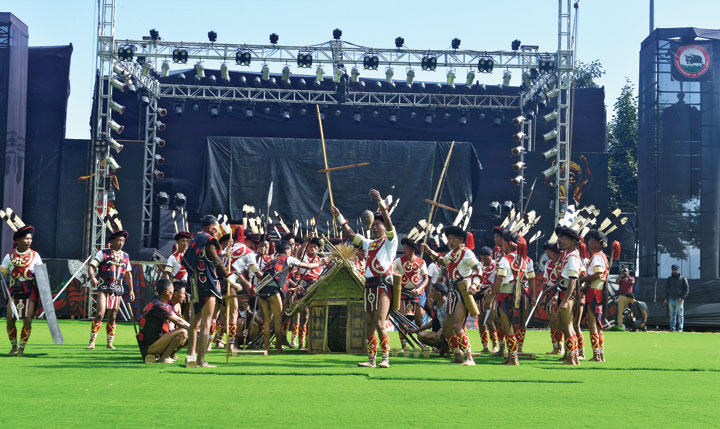The third day of the 10-day Hornbill Festival began with a cultural extravaganza showcasing traditional dances, songs and games of Naga tribes at Naga Heritage Village, Kisama, near Kohima on Tuesday.
Today’s event called “Cultural Connect”, presented by the state’s art and culture department, was held in two sessions.
Grammy winner Pandit Vishwa Mohan Bhat was the special guest of the first session.
The tribes who performed in the morning session included Zeliang, Kuki, Yimchungru, Sumi, Rengma, Kachari, Pochury and Chakhesang.
The show began with Herielim (hornbill dance) performed by Zeliang cultural troupe to pay tribute to hornbill — the state bird of Nagaland. The performers captured movements of the bird. The Kukis performed Savailhun which eulogises a hunter’s valour.
Sangkusukadi (archery) was demonstrated by the Yimchungrus. Sangtam cultural troupe performed Rothsa Nyichi or war dance.
Helo He (game and song) is a folk song that depicts traditions and values. It was performed by the Sumis. The Rengmas presented Ngada dance, a dance performed in Ngada festival.
Baad Bheta puja, a ritual, was performed by Mech Kachari tribe.
Atutu Kukhu (trumpet blowing) was presented by a Pochury troupe. It is an instrument carved out of a special variety of bamboo to ward off wild animals and enemies. Chakhesangs presented Thuno Kuhuo Lizo, a folk song dedicated to women weavers.
The Ao, Phom, Konyak, Lotha, Khiamniungan, Garo, Chang and the Angami tribes performed in the afternoon session.
Aos performed hornbill dance called Tenem Jilu. It depicts the graceful movement of hornbills. This dance is performed by men and women during Moatsu and Tsungremong festivals of the Ao tribe.
Phom cultural troupe performed Nok-Phat which is a dance performed by warriors. The Konyaks demonstrated their traditional game called Vee Kok. Vee is an important forest product which is used for washing and bathing.
The Lothas performed Ematha Shari (dance of joy) which is a dance performed by young men. It is sung during leisure hours after completing domestic chores. The Khiamniungans demonstrated the traditional way of weaving bags and shawls.
The Garo cultural troupe performed Wangala which is usually performed during the Wangala festival — a post-harvest thanksgiving festival.
The Changs performed Lakoula Haupu which depicts raiding of an enemy village.
The Angamis presented a folk tune titled Howe.
The special host for the afternoon session of the Cultural Connect was adviser to the civil administrative works department and Nagaland State Disaster Management Authority Kazheto Kinimi.











